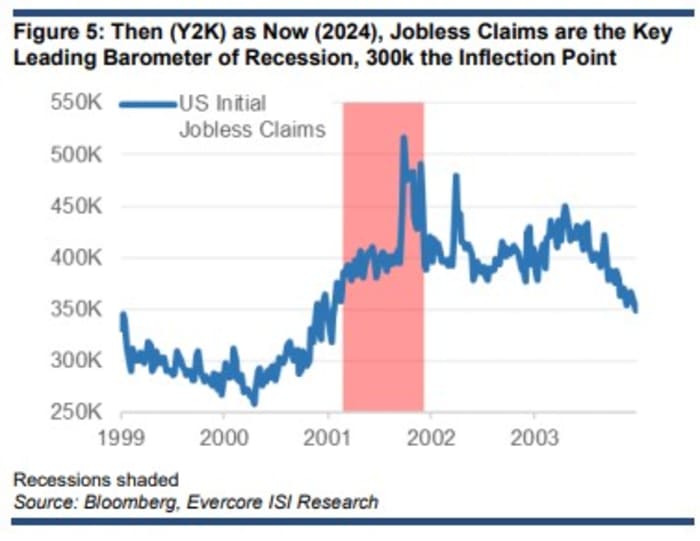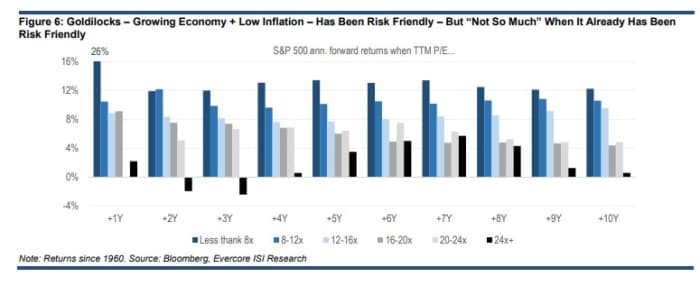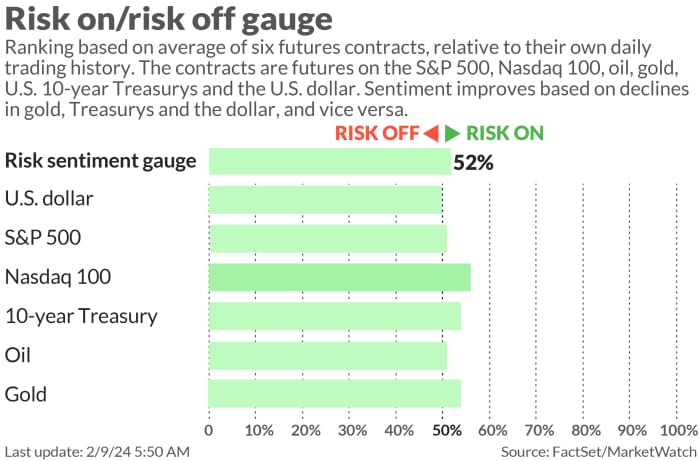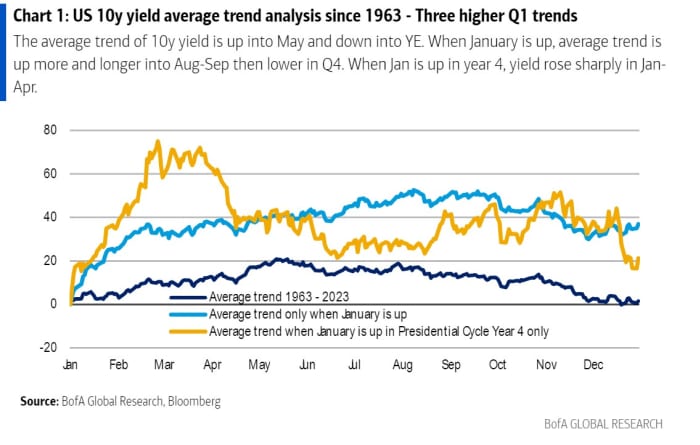Early Friday stock-index futures trading indicate the S&P 500 will start the session several points above the 5,000 mark.
Breaching — and closing above — big round numbers in equity indices inevitably encourages optimists to hope that what was considered resistance can become support.
It can also produce reflections on how the past may give a clue to what comes next. Julian Emanuel, strategist at Evercore ISI, sees a similarity between the Y2K stock market surge of the late 1990’s and today’s market, though he acknowledges the standard caveat: history seldom repeats but often rhymes.
“The unrelenting momentum that has carried the S&P 500 to the round number of 5,000 has few equals in history, the standout example being the internet fueled rally off a similar market bottom in October 1998 versus the pivotal October 2022 low,” says Emanuel in a note sent to clients this week.
To recall, the Y2K phenomenon occurred during the nascent dot-com boom, when some technology stocks got extra propulsion from expectations companies would spend gazillions ensuring their computer systems could switch to 2000 when the new millennium began. Do we have a similar frenzy regarding AI?
Here’s Emanuel’s chart showing the S&P 500’s trajectory from those October lows he’s citing. If the rhyming is rich then today’s market may struggle to make much more headway in this cycle.
Source: Evercore ISI
Emanuel is quick to note the differences. Today’s valuations may be stretched at 22 times trailing twelve month earnings, but that’s well below the 28 times seen at the Y2K/dot-com bubble top.
And after the Y2K/dot-com bubble burst in early 2,000 there was a spike in weekly initial jobless benefit claims a full year ahead of the 2001 recession. Current unemployment claims of around 210,000 and stoic consumer confidence data suggests little sign of such stress just yet.

Source: Evercore ISI
However, he’s still worried by the similarities between now and then. “The price parallels, the positive feeling around the long term potential of generative AI and investors’ new found confidence that money can be made in stocks – as it was in 1999 – despite a 10 year Treasury yield solidly affixed to 4%+, continues to expose equities to inflation, earnings and Fed policy disappointments,” says Emanuel.
Indeed, he thinks the market’s present ‘Goldilocks’ valuation paradigm is consistent with forward average stock returns of zero percent, regardless of whether a recession is averted or not.

Source Evercore ISI
Consequently he favors defense. “We maintain our year end S&P 500 price target of 4,750 and reiterate our preference for communications services, consumer staples, and health care, sectors which have historically outperformed in the time from the Fed’s last hike to the first rate cut,” says Emanuel.
Markets

U.S. stock-index futures
ES00,
NQ00,
were firmer early Friday as benchmark Treasury yields
BX:TMUBMUSD10Y
nudge higher. The U.S. dollar
DXY
was little changed, while oil prices
CL.1,
dipped and gold
GC00,
traded around $2,030 an ounce.
| Key asset performance | Last | 5d | 1m | YTD | 1y |
| S&P 500 | 4,997.91 | 0.79% | 4.48% | 4.78% | 22.18% |
| Nasdaq Composite | 15,793.71 | 1.05% | 5.48% | 5.21% | 34.78% |
| 10 year Treasury | 4.168 | 14.48 | 22.38 | 28.66 | 42.98 |
| Gold | 2,046.60 | -0.51% | -0.34% | -1.22% | 9.07% |
| Oil | 76.32 | 5.41% | 4.89% | 7.00% | -4.31% |
| Data: MarketWatch. Treasury yields change expressed in basis points | |||||
For more market updates plus actionable trade ideas for stocks, options and crypto, subscribe to MarketDiem by Investor’s Business Daily.
The buzz
A revision to the U.S. consumer price index’s seasonal factors will be published at 8:30 a.m. Eastern. “These revisions, if they are large and to the upside, could blow the case for cutting rates,” says Kathleen Brooks, analyst at XTB.
Dallas Fed President Lorie Logan is due to speak at 1:30 p.m. ET.
There are some big premarket moves for shares of companies that reported after Thursday’s close. Investors liked what Cloudflare
NET,
had to say and its stock is up 25%. But numbers and statements from Expedia
EXPE,
down 14%, Affirm
AFRM,
off 11%, and Pinterest
PINS,
falling 11%, were poorly received.
Companies reporting earnings before the opening bell rings on Wall Street include PepsiCo
PEP,
Plains All American Pipeline
PAA,
and Enbridge
ENB,
China’s markets are now closed for a week to celebrate Lunar New Year.
Best of the web
The spectacular crash of a $30 billion property empire.
$3 for a single McDonald’s hash brown? Customers are fed up and pushing back.
The chart
Many investors will have heard of the January effect regarding stocks: that a strong first month often means a good year as a whole. Well, according to Paul Ciana, technical strategist at BofA Securities, a similar thing occurs for the 10-year Treasury yield. He’s crunched the numbers going back to 1963 and as the chart below shows, when the benchmark yield is up in January the trend from February through year-end was higher 61% of the time by +81 basis points on average.

Top tickers
Here were the most active stock-market tickers on MarketWatch as of 6 a.m. Eastern.
| Ticker | Security name |
|
TSLA, |
Tesla |
|
NVDA, |
Nvidia |
|
PLTR, |
Palantir Technologies |
|
ARM, |
Arm Holdings |
|
MARA, |
Marathon Digital |
|
TSM, |
Taiwan Semiconductor Manufacturing ADR |
|
AAPL, |
Apple |
|
AMC, |
AMC Entertainment |
|
NIO, |
NIO ADR |
|
GME, |
GameStop |
Random reads
‘My AI boyfriend Is boring me to death’.
Chernobyl’s cancer-resilient mutant wolves.
Turning the air blue. The next stage in ruining football.
American CEOs visiting China can’t escape it: they have to dance on stage.
Need to Know starts early and is updated until the opening bell, but sign up here to get it delivered once to your email box. The emailed version will be sent out at about 7:30 a.m. Eastern.
Check out On Watch by MarketWatch, a weekly podcast about the financial news we’re all watching. This episode: The start of the AI boom, and one of the Super Bowl’s sweetest stars. Earnings season has Big Tech talking about generative AI. But will chatbots become big business? Plus, we nerd out over the candy relic that went from $50 million to $500 million in annual sales.
This story originally appeared on Marketwatch

